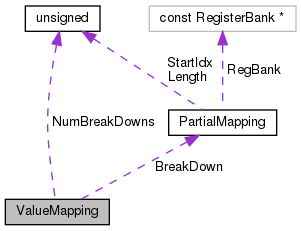Helper struct that represents how a value is mapped through different register banks. More...
#include "llvm/CodeGen/GlobalISel/RegisterBankInfo.h"

Public Member Functions | |
| ValueMapping () | |
| The default constructor creates an invalid (isValid() == false) instance. More... | |
| ValueMapping (const PartialMapping *BreakDown, unsigned NumBreakDowns) | |
| Initialize a ValueMapping with the given parameter. More... | |
| const PartialMapping * | begin () const |
| Iterators through the PartialMappings. More... | |
| const PartialMapping * | end () const |
| bool | isValid () const |
| Check if this ValueMapping is valid. More... | |
| bool | verify (unsigned MeaningfulBitWidth) const |
Verify that this mapping makes sense for a value of MeaningfulBitWidth. More... | |
| void | dump () const |
| Print this on dbgs() stream. More... | |
| void | print (raw_ostream &OS) const |
Print this on OS;. More... | |
Public Attributes | |
| const PartialMapping * | BreakDown |
| How the value is broken down between the different register banks. More... | |
| unsigned | NumBreakDowns |
| Number of partial mapping to break down this value. More... | |
Detailed Description
Helper struct that represents how a value is mapped through different register banks.
- Note
- : So far we do not have any users of the complex mappings (mappings with more than one partial mapping), but when we do, we would have needed to duplicate partial mappings. The alternative could be to use an array of pointers of partial mapping (i.e., PartialMapping **BreakDown) and duplicate the pointers instead.
E.g., Let say we have a 32-bit add and a <2 x 32-bit> vadd. We can expand the <2 x 32-bit> add into 2 x 32-bit add.
Currently the TableGen-like file would look like:
With the array of pointer, we would have:
Given that a PartialMapping is actually small, the code size impact is actually a degradation. Moreover the compile time will be hit by the additional indirection. If PartialMapping gets bigger we may reconsider.
Definition at line 859 of file RegisterBankInfo.h.
Constructor & Destructor Documentation
◆ ValueMapping() [1/2]
|
inline |
The default constructor creates an invalid (isValid() == false) instance.
Definition at line 868 of file RegisterBankInfo.h.
◆ ValueMapping() [2/2]
|
inline |
Initialize a ValueMapping with the given parameter.
BreakDown needs to have a life time at least as long as this instance.
Definition at line 873 of file RegisterBankInfo.h.
Member Function Documentation
◆ begin()
|
inline |
Iterators through the PartialMappings.
Definition at line 877 of file RegisterBankInfo.h.
◆ dump()
| void ValueMapping::dump | ( | ) | const |
Print this on dbgs() stream.
◆ end()
|
inline |
Definition at line 878 of file RegisterBankInfo.h.
◆ isValid()
|
inline |
Check if this ValueMapping is valid.
Definition at line 881 of file RegisterBankInfo.h.
◆ print()
| void ValueMapping::print | ( | raw_ostream & | OS | ) | const |
Print this on OS;.
◆ verify()
Verify that this mapping makes sense for a value of MeaningfulBitWidth.
- Note
- This method does not check anything when assertions are disabled.
- Returns
- True is the check was successful.
Member Data Documentation
◆ BreakDown
| const PartialMapping* ValueMapping::BreakDown |
How the value is broken down between the different register banks.
Definition at line 861 of file RegisterBankInfo.h.
◆ NumBreakDowns
| unsigned ValueMapping::NumBreakDowns |
Number of partial mapping to break down this value.
Definition at line 864 of file RegisterBankInfo.h.
The documentation for this struct was generated from the following file:
- include/llvm/CodeGen/GlobalISel/RegisterBankInfo.h
 1.8.13
1.8.13